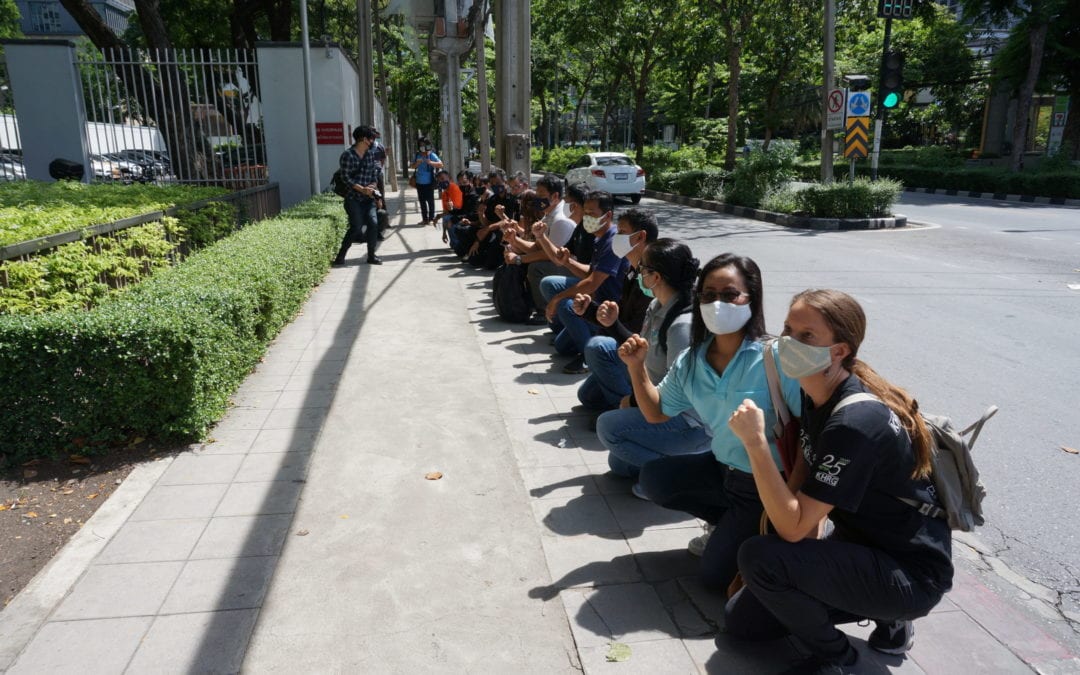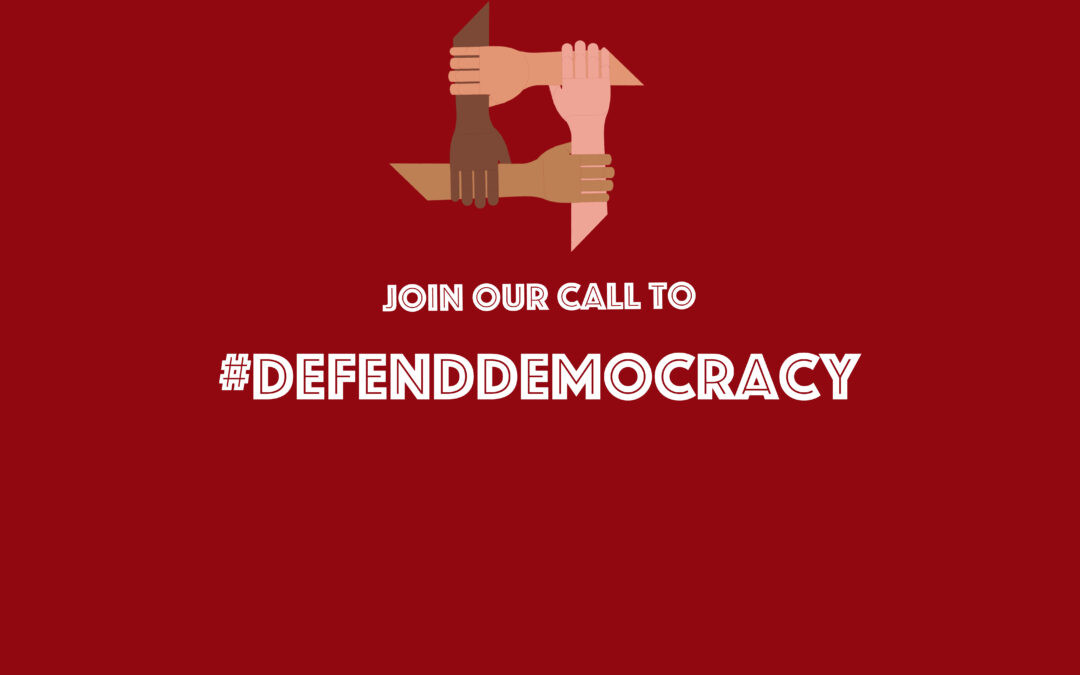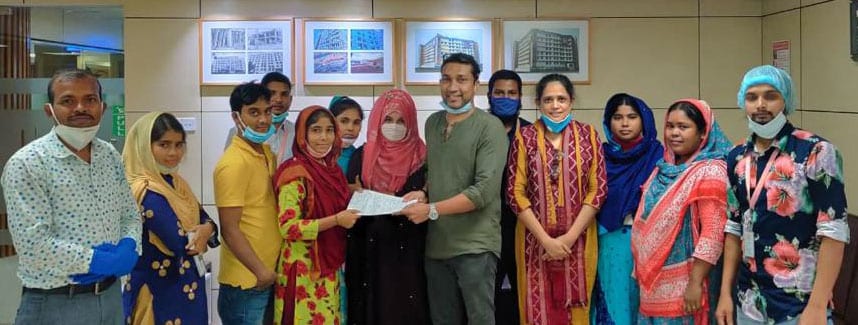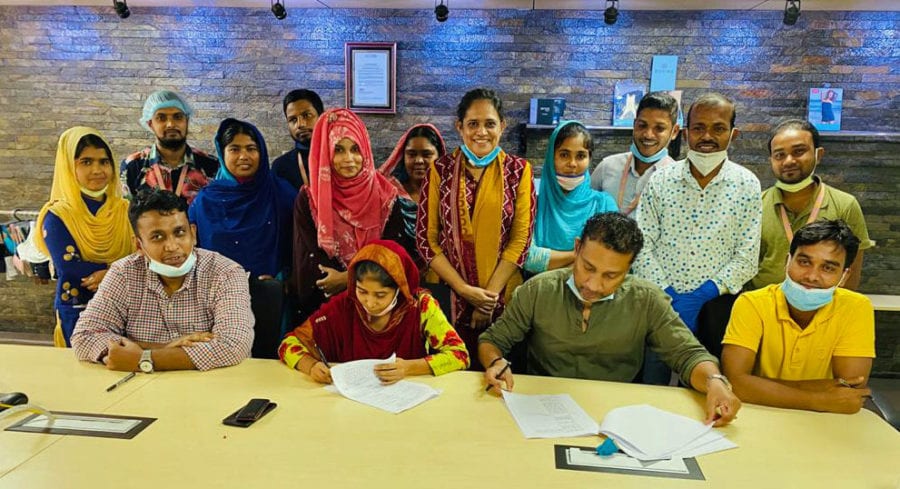Jun 26, 2020
The rankings used to bring with them a risk to a country’s reputation. “Reputationally it meant a lot. It was embarrassing to be on Tier 3 or the Tier 2 Watch List. And if the tier rankings don’t mean anything, then that reputational pressure is gone,” said the Solidarity Center’s Neha Misra.

Jun 25, 2020
Around the world, workers and their labor unions and have joined in solidarity with the Black Lives Matter protesters in the United States, demonstrating support for peaceful marches, and decrying racism, police brutality and inequality—in the United States and in their own countries.
In South Africa, the Congress of South African Trade Unions (COSATU) expressed outrage “at the extent to which racism is deeply entrenched and vicious in the U.S., particularly against blacks and other minority groups in a country purporting to be the world’s leading democracy.” COSATU also is one of the organizers of “Black Friday,” a campaign calling on South Africans to wear black every Friday to show solidarity in the fight against racism.
The South African Federation of Trade Unions wrote: “Saying ‘Black Lives Matter!’ is not just about opposing police brutality though. It is also about the structure of society: the political and economic systems that devalue black lives, black land, black culture and blackness.”
In a letter, the Nigerian Labor Congress condemned the murder of George Floyd and demanded justice for his killing, and demanded that world governments and institutions “take very strong and stern steps to stamp out racism in all its shades on the streets, in the workplace, and on play grounds.” And the Amalgamated Union of Kenya Metal Workers took to Twitter, calling George Floyd’s murder “unacceptable in this modern day.”
Meanwhile, the Confederation of Ethiopian Trade Unions said, “We recognize that anti-blackness is an injustice that must continue to be addressed fearlessly in the United States and around the world. We strongly believe that labor unions have a crucial role to play in this fight.”
In a letter of support, the Zimbabwe Congress of Trade Unions said, “Racism has no place in the modern-day world,” adding that it “supports the fight of the American people to dismantle racism and establish equality and social justice.”
Africans also marched in Ghana, Kenya, Liberia, Nigeria and Senegal.

Union activists support rally in support of Black Lives Matter in Thailand, Nigeria, Brazil and Tunisia.
Across Brazil, unions have organized rallies and panel discussions, and have sent letters in support of the U.S. protest movement. The CUT, which also participated in #BlackoutTuesday, said, “There have been centuries of oppression, inequalities and social injustices. Especially in this pandemic moment, the working class is the one who suffers the consequences both for the defense of lives as well as for the defense of jobs and rights, in addition to ensuring survival for many who can no longer guarantee their income in the informal economy.”
Brazil’s National Confederation of Workers in the Financial Sector (CONTRAF) repudiated all police violence against black people—especially in Brazil, where “75.4% of victims by Brazilian police were black” in 2019. And Brazil’s UGT, garment-sector federation CNTRV and the Center for Human Rights and Immigrant Citizenship conducted an online anti-racism campaign.
Tunisia’s UGTT called on all the unions around the globe to “build an international united front against racism and hatred, and to build social justice and equality in the USA and all over the world.”
On the other side of the world in Bangkok, about 50 Thai trade union leaders, staff and members gathered for the rally at the U.S. embassy to call on the U.S. government to stop police violence, racism and discrimination against black people. Garment unions in Bangladesh and Myanmar—in their own difficult fight for survival during the COVID-19 pandemic—posted photos of solidarity. To protesters in U.S. streets, the Bangladesh Sommolito Garment Sramik Federation tweeted, “What you are doing is necessary and vital to dismantle the oppression that saturates our world and deliver a future where justice prevails.”
All are Solidarity Center partners.
See the Solidarity Center’s statement on Black Lives Matter and the fight for social justice here.

Jun 25, 2020
More than 500 political, civil leaders, Nobel Laureates and pro-democracy institutions—including the Solidarity Center—are calling for the defense of democracy and warning that fundamental freedoms are under threat from governments using the COVID-19 pandemic to tighten their grip on power.
In a letter released today, the signatories from around the world and a broad political spectrum said, “Repression will not help to control the pandemic. Silencing free speech, jailing peaceful dissenters, suppressing legislative oversight and indefinitely canceling elections all do nothing to protect public health. On the contrary, these assaults on freedom, transparency and democracy will make it more difficult for societies to respond quickly and effectively to the crisis through both government and civic action.”
The pandemic and the global movement for racial equality have demonstrated that “democracy is more important than ever,” the group said in a press release. “Democracy allows for civil society to mobilize, for inequalities to be confronted, for policy issues to be openly debated, for trustworthy information to freely flow, and governments to be accountable to citizens—all essential tools for successfully dealing with the current public health emergency and its consequences.”
They added that the key elements of liberal democracy—credible and free flowing information, fact-based debate about policy options, voluntary self-organization of civil society and open engagement between government and society—are vital to combating the pandemic. When voices are suppressed, “the results can be deadly, not for just one country but for the entire world.”
Jun 24, 2020
The garment industry tends to invest where the rule of law is weakest, where there are sizable degrees of poverty and a degree of impunity, said the Solidarity Center’s David Welsh on the podcast, “On the Level with Jeff Hutton,” With the advent of the pandemic, millions of workers are left without wages and economic and job security–and the blame lies with the brands, he said. (Starts at minute 19:30)

Jun 22, 2020
More than 2,000 garment workers in Bangladesh are celebrating a new collective bargaining agreement that includes a 10 percent pay increase—double the amount required by law—and creation of a committee to prevent violence and harassment on the job. The pact, negotiated by the Hop Lun Apparels Ltd. Sommilito Sramik Union (HLALSSU), is retroactive to January.
The new agreement comes as many garment workers in Bangladesh and around the world are being laid off without pay because major fashion brands are canceling orders due to lack of demand during the novel coronavirus pandemic.

2,000+ Bangladesh garment workers have new contract that includes a 10 percent wage increase and a day care facility for their children. Credit: SGSF
“The guarantee of promotions for women to the higher posts and the establishment of the sexual harassment committee will empower the women and provide safeguards against sexual abuse and harassment in our factory,” says Aklima HLALSSU president.
Under the new contract, Hop Lun will set up a day care facility for workers’ children younger than age six, who will be guaranteed quality care and education. Factory management will provide free ultrasound tests for all pregnant workers, subsided food in the factory canteen, and guarantee a minimum of 20 women workers will be promoted annually.
Under Bangladesh law, women workers are entitled to 16 weeks’ maternity leave, yet employers often do not grant garment workers the required leave. The new contract provides enforcement of the law.
“It is because we have a strong union that we could maintain a good relation with the factory management and sign this collective bargaining agreement,” says Sommilito Garments Sramik Federation (SGSF) General Secretary Nahidul Hasan Nayan. “That is why, during this COVID-19 crisis, Hop Lun factory maintained the highest standard of safety for its workers and has provided each and every employee with proper protective equipment.”
The contract also includes provisions to streamline union representation, with the employer providing space for a union office and automatically deducting union dues. Union leaders will be involved in trainings and workshops and joint meetings with management.





